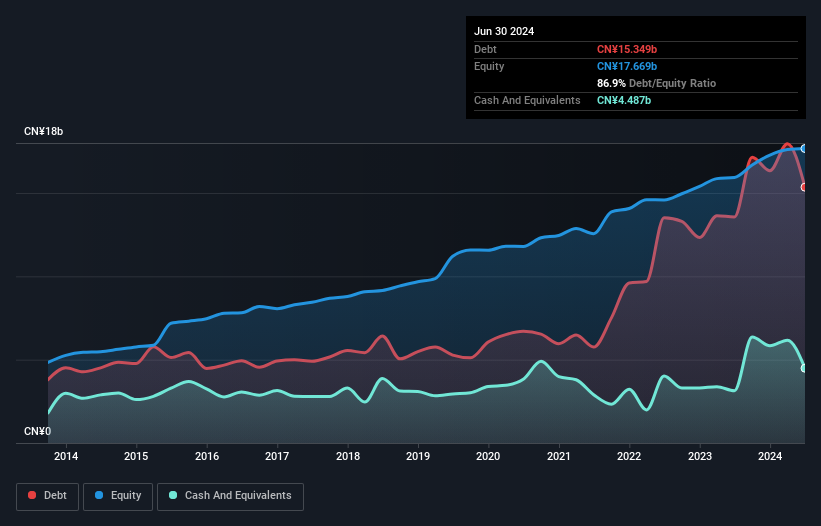Legendary fund manager Li Lu (who Charlie Munger backed) once said, 'The biggest investment risk is not the volatility of prices, but whether you will suffer a permanent loss of capital.' So it might be obvious that you need to consider debt, when you think about how risky any given stock is, because too much debt can sink a company. We note that Shenzhen Gas Corporation Ltd. (SHSE:601139) does have debt on its balance sheet. But is this debt a concern to shareholders?
What Risk Does Debt Bring?
Debt assists a business until the business has trouble paying it off, either with new capital or with free cash flow. Ultimately, if the company can't fulfill its legal obligations to repay debt, shareholders could walk away with nothing. While that is not too common, we often do see indebted companies permanently diluting shareholders because lenders force them to raise capital at a distressed price. Of course, the upside of debt is that it often represents cheap capital, especially when it replaces dilution in a company with the ability to reinvest at high rates of return. When we examine debt levels, we first consider both cash and debt levels, together.
View our latest analysis for Shenzhen Gas
What Is Shenzhen Gas's Debt?
As you can see below, at the end of June 2024, Shenzhen Gas had CN¥15.3b of debt, up from CN¥13.6b a year ago. Click the image for more detail. However, because it has a cash reserve of CN¥4.49b, its net debt is less, at about CN¥10.9b.

A Look At Shenzhen Gas' Liabilities
According to the last reported balance sheet, Shenzhen Gas had liabilities of CN¥19.9b due within 12 months, and liabilities of CN¥5.87b due beyond 12 months. On the other hand, it had cash of CN¥4.49b and CN¥4.98b worth of receivables due within a year. So its liabilities outweigh the sum of its cash and (near-term) receivables by CN¥16.3b.
This deficit is considerable relative to its market capitalization of CN¥20.0b, so it does suggest shareholders should keep an eye on Shenzhen Gas' use of debt. This suggests shareholders would be heavily diluted if the company needed to shore up its balance sheet in a hurry.
We measure a company's debt load relative to its earnings power by looking at its net debt divided by its earnings before interest, tax, depreciation, and amortization (EBITDA) and by calculating how easily its earnings before interest and tax (EBIT) cover its interest expense (interest cover). Thus we consider debt relative to earnings both with and without depreciation and amortization expenses.
Shenzhen Gas's net debt is 3.5 times its EBITDA, which is a significant but still reasonable amount of leverage. However, its interest coverage of 19.3 is very high, suggesting that the interest expense on the debt is currently quite low. Shenzhen Gas grew its EBIT by 7.3% in the last year. Whilst that hardly knocks our socks off it is a positive when it comes to debt. The balance sheet is clearly the area to focus on when you are analysing debt. But it is future earnings, more than anything, that will determine Shenzhen Gas's ability to maintain a healthy balance sheet going forward. So if you want to see what the professionals think, you might find this free report on analyst profit forecasts to be interesting.
But our final consideration is also important, because a company cannot pay debt with paper profits; it needs cold hard cash. So it's worth checking how much of that EBIT is backed by free cash flow. Over the last three years, Shenzhen Gas saw substantial negative free cash flow, in total. While that may be a result of expenditure for growth, it does make the debt far more risky.
Our View
Shenzhen Gas's conversion of EBIT to free cash flow and level of total liabilities definitely weigh on it, in our esteem. But the good news is it seems to be able to cover its interest expense with its EBIT with ease. It's also worth noting that Shenzhen Gas is in the Gas Utilities industry, which is often considered to be quite defensive. When we consider all the factors discussed, it seems to us that Shenzhen Gas is taking some risks with its use of debt. So while that leverage does boost returns on equity, we wouldn't really want to see it increase from here. There's no doubt that we learn most about debt from the balance sheet. But ultimately, every company can contain risks that exist outside of the balance sheet. Be aware that Shenzhen Gas is showing 2 warning signs in our investment analysis , and 1 of those is significant...
Of course, if you're the type of investor who prefers buying stocks without the burden of debt, then don't hesitate to discover our exclusive list of net cash growth stocks, today.
New: Manage All Your Stock Portfolios in One Place
We've created the ultimate portfolio companion for stock investors, and it's free.
• Connect an unlimited number of Portfolios and see your total in one currency
• Be alerted to new Warning Signs or Risks via email or mobile
• Track the Fair Value of your stocks
Have feedback on this article? Concerned about the content? Get in touch with us directly. Alternatively, email editorial-team (at) simplywallst.com.
This article by Simply Wall St is general in nature. We provide commentary based on historical data and analyst forecasts only using an unbiased methodology and our articles are not intended to be financial advice. It does not constitute a recommendation to buy or sell any stock, and does not take account of your objectives, or your financial situation. We aim to bring you long-term focused analysis driven by fundamental data. Note that our analysis may not factor in the latest price-sensitive company announcements or qualitative material. Simply Wall St has no position in any stocks mentioned.
About SHSE:601139
Average dividend payer and slightly overvalued.
Similar Companies
Market Insights
Community Narratives



